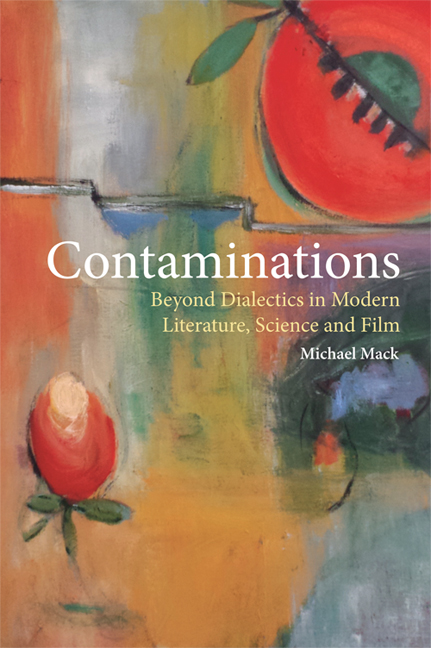Book contents
- Frontmatter
- Contents
- Acknowledgements
- Dedication
- Introduction: Climate Change and the Contamination of the Anthropocene
- 1 Contaminating Psychology with Biology: Descartes, Spinoza, Freud and Žižek
- 2 Contaminating the Visible with the Invisible: From Einstein via H. G. Wells to Hannah Arendt, Luhmann and Derrida
- 3 Contamination of Nature with Society: The Collapse of Natural Order from Melville to Wells and Ellison
- 4 Contaminating Judgement with its Suspension: Guilt and Punishment in Walter Benjamin, Herman Melville and Henry James
- 5 Contaminating the Digital: Action and Perception in Henry James and Alfred Hitchcock
- 6 Contaminating the Sacred with the Profane: Pier Paolo Pasolini and Biopolitics
- 7 Contaminating Posthumanism
- Bibliography
- Index
3 - Contamination of Nature with Society: The Collapse of Natural Order from Melville to Wells and Ellison
Published online by Cambridge University Press: 05 August 2016
- Frontmatter
- Contents
- Acknowledgements
- Dedication
- Introduction: Climate Change and the Contamination of the Anthropocene
- 1 Contaminating Psychology with Biology: Descartes, Spinoza, Freud and Žižek
- 2 Contaminating the Visible with the Invisible: From Einstein via H. G. Wells to Hannah Arendt, Luhmann and Derrida
- 3 Contamination of Nature with Society: The Collapse of Natural Order from Melville to Wells and Ellison
- 4 Contaminating Judgement with its Suspension: Guilt and Punishment in Walter Benjamin, Herman Melville and Henry James
- 5 Contaminating the Digital: Action and Perception in Henry James and Alfred Hitchcock
- 6 Contaminating the Sacred with the Profane: Pier Paolo Pasolini and Biopolitics
- 7 Contaminating Posthumanism
- Bibliography
- Index
Summary
Introduction: Kandel's contamination of modernism with biology
Modernism began in the mid-nineteenth century as a response not only to the restrictions and hypocrisies of everyday life, but also as a reaction to the Enlightenment's emphasis on the rationality of human behaviour. The Enlightenment, or Age of Reason, was characterized by the idea that all is well with the world because human action is governed by reason. It is through reason that we achieve enlightenment, because our mind can exert control over our emotions and feelings. (Kandel 2012: 11)
In the quotation above, Eric R. Kandel locates the beginning of modernism in the middle of the nineteenth century. At that time the dark side of the Industrial Revolution had already become apparent, and with it the ambiguity of modernity's – or, in other words, the enlightenment's – claim that reason's controlling position over the body and the emotions guarantees unambiguous progress: ‘The modernist reaction to the Enlightenment came in the aftermath of the Industrial Revolution, whose brutalizing effects revealed that modern life had not become as mathematically perfect, or as certain, rational, or enlightened, as advances in the eighteenth century had led people to expect’ (Kandel 2012: 12). Kandel further substantiates his claim that modernism begins not at the end but at the middle of the nineteenth century by pinpointing the then emerging rise of biology as a radical break with modernity's/the Enlightenment's intellectual anchorage in physics and astronomy: ‘As astronomy and physics inspired the Enlightenment, so biology inspired modernism. Darwin's 1859 book On the Origin of Species introduced the idea that human beings are not created uniquely by an all-powerful God but are biological creatures that evolved from simpler animal ancestors’ (Kandel 2012: 12). Far from claiming (see the concluding section to this chapter) that mid-nineteenth-century works such as Büchner's Danton's Death, Hawthorne's Scarlet Letter or Melville's Moby Dick are classic modernist works of literature avant là lettre, the following chapter nevertheless argues that in their concern with the potential modern loss of worldliness and diversity these texts are less about their historical subject matter than about the fears for a future where subjectivity has been subjected to bio-political visibility and measurability.
- Type
- Chapter
- Information
- ContaminationsBeyond Dialectics in Modern Literature, Science and Film, pp. 77 - 106Publisher: Edinburgh University PressPrint publication year: 2016



